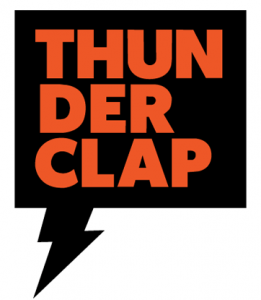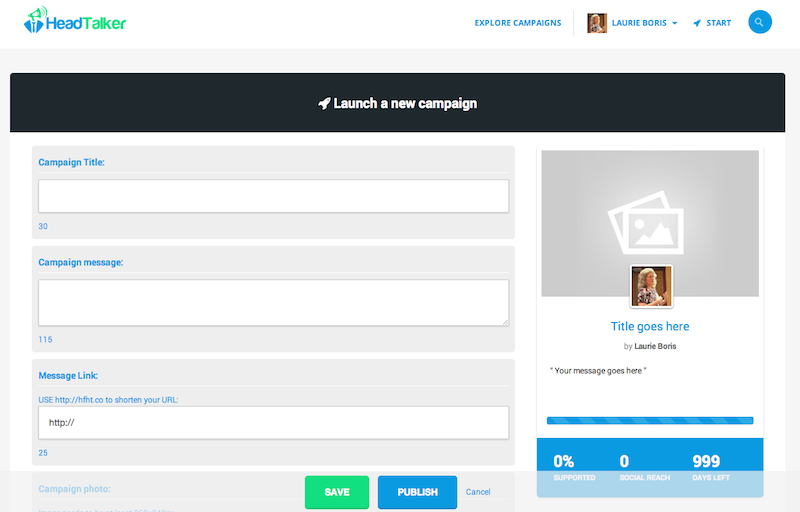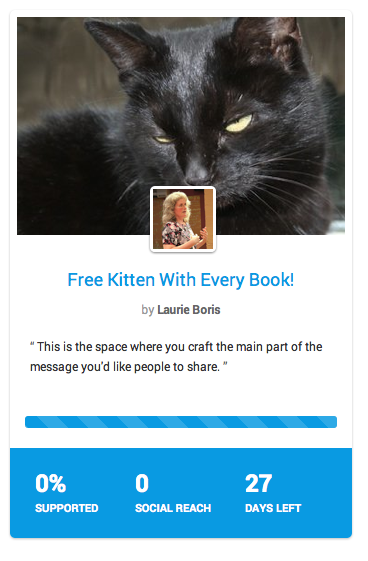 Unless you’ve been busier than Kanye West’s damage control team, you might have noticed indie authors using various crowdfunding ventures like Kickstarter to raise the scratch to produce their books. Ask people what they think about the practice and you’re bound to start an argument, usually about the money. But what if you could engineer a crowdfunding effort that uses a different sort of currency—the social media reach of those generous enough to lend their support to your book promotion? That’s what programs like Thunderclap and HeadTalker aim to do.
Unless you’ve been busier than Kanye West’s damage control team, you might have noticed indie authors using various crowdfunding ventures like Kickstarter to raise the scratch to produce their books. Ask people what they think about the practice and you’re bound to start an argument, usually about the money. But what if you could engineer a crowdfunding effort that uses a different sort of currency—the social media reach of those generous enough to lend their support to your book promotion? That’s what programs like Thunderclap and HeadTalker aim to do.
For both programs, often called “crowdspeaking platforms,” the system is pretty simple. Craft a “shareable” message that you would like to go out on social media. Invite people to support it. They do this by allowing the program to post the message on their behalf to their fans, friends, and followers – through Twitter, Facebook, LinkedIn, and Tumbler in the case of HeadTalker and Twitter, Facebook, and LinkedIn in the case of Thunderclap. If you get enough supporters to commit to your initiative (the “tipping” threshold differs by program), ALL the messages will be released at the same time on the same day, amplifying your reach. You will basically be glitter-bombing the interwebs with your message.
If you don’t get enough supporters, the message will not go out. Buh-bye. Done.
A lot of people have been using these programs to draw attention to a cause or an event, like kitten rescue day in the park. Maybe using it to promote a book isn’t as altruistic a cause, but it’s a small leap to see how useful Thunderclap and HeadTalker could also be for a small, focused effort like a blog tour for your new release or a giveaway.
The advantages:
- A lot of attention all at once. Just consider the math. Fifty friends share one message about your new book to their ninety-seven friends. That’s…okay, I’ve never been very good at math. But that’s a lot of eyeballs. It’s also kind of impressive to look down your Twitter feed and see, oh, a zillion messages buzzing around about your promotion. And all the other people who might be seeing it and sharing it.
- It’s easy and free. At least the basic plans are, which are plenty adequate for what most of us will be doing this for.
- The people who choose to support you can customize the message to suit their taste. So if you don’t feel great about sending out the same message as everyone else, and want to give it your own twist, have at it!
The drawbacks:
- The programs ask for some goodwill on behalf of your friends and followers. You might not feel comfortable asking for so many favors. Everyone’s comfort level with asking for help is a little different.
- Although the programs ASSURE the privacy of those who sign up, and ASSURE that the message will only be shared once, some people are a little hinky about giving an app permission to do anything. You can, however, revoke the app’s access any time you’d like.
- The overload factor. Again, this depends on your personal threshold for seeing ninety-seven notifications about your book every time you open Twitter. It’s a lot of reach…but it’s a lot of attention. I recently ran a Thunderclap and a HeadTalker for my new book’s one-day book blog blitz, which included a Rafflecopter giveaway that went on for four days. That’s…a lot of Tweets.
How to do it (this example was done using HeadTalker):
- Go to headtalker.com and open an account. (https://www.thunderclap.it/ for Thunderclap.)
- Start a new campaign.
- Give it a title.
- Craft the main message you want people to share.
- Add a photo, text, number of supporters you want to shoot for and by what date.
- Save and submit for approval.
- Promote it using your usual sources.
- Watch the interwebs’ glitter cannons explode.
Here’s how your basic HeadTalker page will look:
Conclusions
I just did this for a book release. (Here’s how my Thunderclap page looked.) It was fun and generated some excitement and some new friends and followers on social media. More people knew about my new book afterward than had before. I would definitely try this again, although maybe only for BIG events like a new book launch, since it’s a lot to ask of my friends.
Have you ever tried anything like this? Participated in one? What did you like or not like about it?



Nice! I think with your own first hand experience with this, it made much more sense to me. Esp liked the link to your Thunderclap page. Thanks Lori, may try this for my own book release later this month. (smiles)
Oh my gosh, can’t believe I misspelled your name! Very sorry about that Laurie. I really need that other cup of coffee now 🙂
I’ll have one for you, Felipe. No problem at all. And thank you for visiting.
Thank goodness! I knew I felt a difference. Thanks Laurie (smiles).
This is pretty cool, Laurie. When I used a publicist, she did basically the same thing (among a whole bunch of other things!), but by tweeting to various lists. The list members then retweeted her message. I dunno if it sold me any books or not — I’m still not convinced that Twitter sells books — but it sure was fun to watch those retweets pile up. 🙂
I don’t know that Twitter sells too many books either, Lynne. But I was going for exposure and to invite people to sign up for a giveaway. And yes, the book promo company I worked with did have some tags that would generate retweets…that helped, too. Still sorting out the value in all this, but I think it was a good jump-start. Thanks!
Actually, that would be a good exploration, Lynne. I know people who swear by Twitter to sell books, or at least get lots of downloads during promotions. Maybe it’s a genre thing? Curious. Martin Crosbie recommends we ask our readers where they found our books. Could be something to look a little closer at.
I used Thunderclap recently and I have supported some. Mine wasn’t successful but I didn’t actually set it up that well and had a short time scale. I’m planning to try again with a much longer period. They are a good way to promote, meet new folks and find interesting things to support.
Hope the new one works better, Alex!
Thanks, Laurie. I understand this process better now–the examples helped a lot. I have supported a few Thunderclap promotions. I still can’t get comfortable with giving them permission beyond just that one event. I know they promise not to use my contacts for anything else. Then why do they need the wider permission?
Thanks, Pete. I don’t know why they ask for that, but I’ve never seen them do anything untoward on my behalf. Yet.
I’ll definitely keep this in mind for when my next book is ready.
Are you in the middle of another one, Yvonne? Great! Any idea when it might be out? I’ll be looking forward eagerly to it’s release.
Yes. But they usually take about two years so I have a long way to go yet. This one will be very different but still magic realism – I think.
Thanks for the info! I am intrigued by the free kittens — very funny! And I am also one of those annoying people who resists giving apps any permissions. Most of all, I am not going to do this myself just because I know I am not willing to turn my own twitter feed into a very promotional thing, so I’d be terrible at reciprocating. I’ll do the occasional retweet, or share a friend’s news, and announce my own stuff occasionally, too, but fundamentally I just don’t like to use Twitter that way. Back when my feed was small enough that I actually tried to read it, I would often unfollow people who were annoyingly promotional. “Buy my book” just gets old.
I do think Twitter sells books … laboriously … if you can find your target reader, follow him or her, and thereby get him or her to check you out (mostly out of curiosity). That’s about it. If that person is as inundated as I am, I suspect he is unlikely to ever notice one of my tweets again! In fact, I’ve started using lists just so I can truly follow a few people I really want to follow.
Hey Laurie!
Thank you so much for using our crowdspeaking platform and featuring us in this article!
It is awesome to see that you had a successful campaign on HeadTalker!
One thing that we would like to add to this is that HeadTalker gives 250K social reach to all new campaigns that launch through our platform. We are also the first crowdspeaking platform in the world that is available to LinkedIn users.
We believe that the power is with the crowd and that together we can be heard. The people who use our site have our undivided attention and we focus to try and make everyone happy when they use HeadTalker.
We look forward to any campaigns that may come from this article!
We hope you all have an amazing day!
Thank you for stopping by! 😀
Hi Laurie,
I think your use of these new promotional tools is stellar, and I’m happy that it helped you market your new book. But, I have a confession to make.
After your and a few friends promos were over I went into my settings and revoked access through the app. I couldn’t believe the number of other apps that were activated there. I honestly don’t recall allowing them. My point, a little off topic—sorry—is that my computer has not been behaving properly since I activated all this stuff. I don’t know enough about what they do or don’t do with the information, but my Mac feels its under attack. I’m taking it to the doctor next week for a check-up. 😉
Oh, no! Lois, I hope your computer is better. It’s a good idea to go through those things once in a while.
Good post, Laurie. Until I engaged a tour director for a single day blitz for a new release, I had never heard of HeadTalker or ThunderClapit. One needs 100 supporters on ThunderClap and 50 supporters on HeadTalker for the promos to go live. I put out a few tweets and emails asking for support and got them to the tune of above 700,000 followers. A single tweet went out to my supporters followers. The tweet did not sell books, but was great for exposure and I made many new friends and I have since supported other ThunderClaps. I do think is is smart to return to both sites and revoke permission after the promos we support are completed. I like the programs for new releases and exposure. I do not consider Twitter a sales venue. However, I have followed back on Twitter and discovered books and downloaded a book on FREE or .99. Since KU arrived in our indie universe, I’ve been more active in downloading higher priced books in genres I enjoy and luck up on Twitter. My caveat is this: If I want to sell a 1000 books, I tuck into promoters who have subscribers who buy books. I have colleagues who have above 30,000 followers on FB, their blogs and Twitter. When those same colleagues have a new release those followers are NOT buying the book. If they were, the book would hit the bestseller lists, and they don’t. My colleagues have to do what I do. Pump the book. And! that works for me.
Thanks for the run-down, Jackie. Good to know…
Great info, Laurie. I’m thinking of using them for a book launch in the future. If nothing else, it should be fun. 🙂
Thanks, Dale, and good luck! 😀
This is a great idea in principle but I’m one of those paranoid people who never let ‘apps’ do anything at all, just because I’m a control and security freak. 🙁
That said, this could be the next big thing in promotion, especially amongst the younger set who are more laidback about apps and social media.
Thanks for the info., Laurie.
I hear you, AC. Hopping on to the main site was an experience, and seeing all the ways people are using this for social causes.
joe’s new balance
joe’s new balance outlet
christian louboutin outlet
christian louboutin shoes
christian louboutin sale
christian louboutin outlet
christian louboutin shoes
christian louboutin sale
joe’s new balance
joe’s new balance outlet